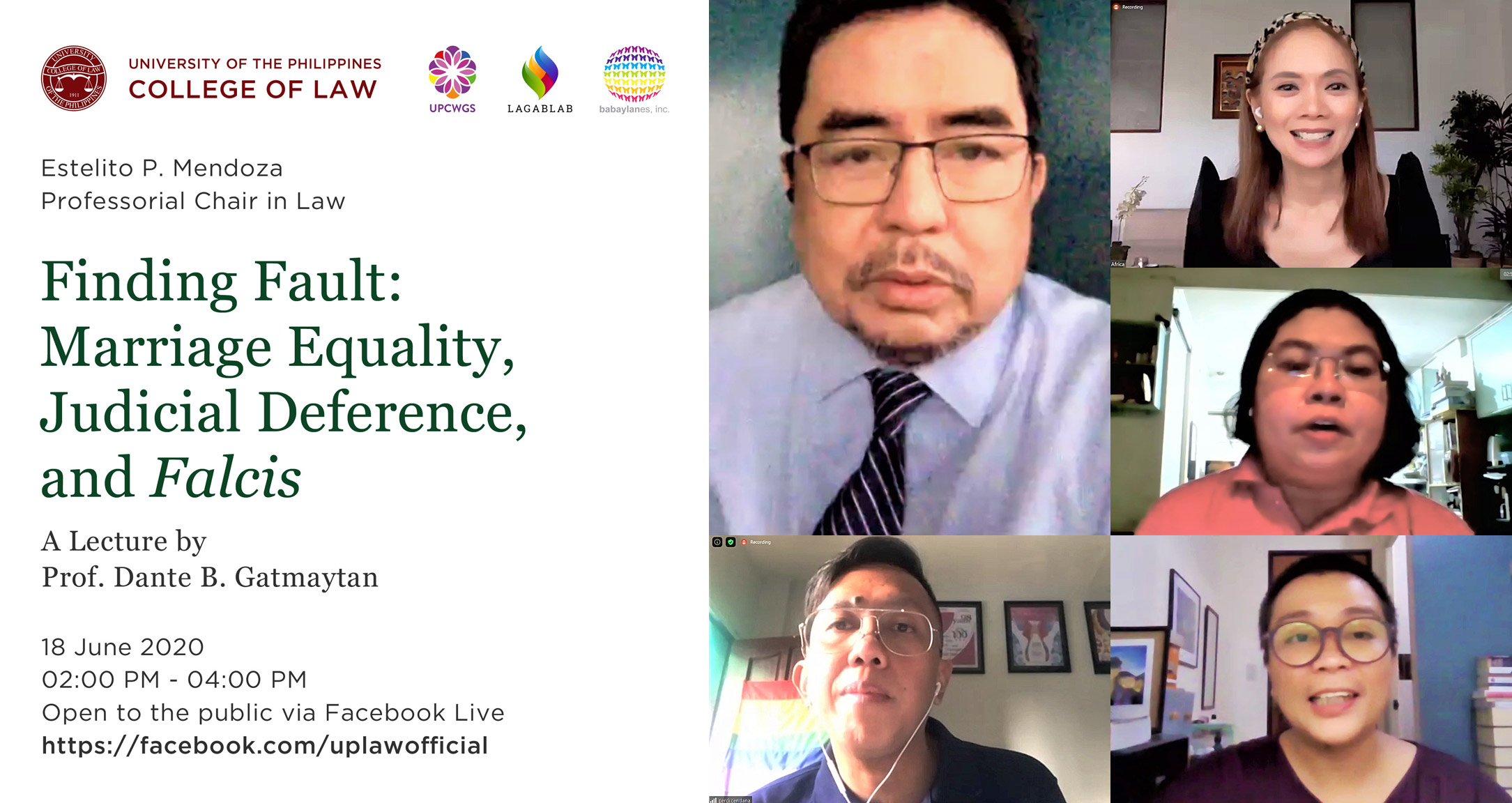The University of the Philippines College of Law hosted a free online lecture titled “Finding Fault: Marriage Equality, Judicial Deference, and Falcis”

The University of the Philippines College of Law hosted a free online lecture titled “Finding Fault: Marriage Equality, Judicial Deference, and Falcis” conducted by Professor Dante Gatmaytan on Thursday, 18 June 2020, as part of the Estelito P. Mendoza Professorial Chair in Law.
Professor Gatmaytan’s paper, proposed a framework for Courts in addressing questions of constitutionality—particularly when there is an assertion of discrimination under the due process clause of the Constitution—and in granting Pareto-improving individual rights as applied in the 2019 case of Falcis III v. Civil Registrar General.
In his lecture, Professor Gatmaytan argued against the constitutionality of Articles 1 and 2 of the Family Code, critiquing the Supreme Court Falcis decision. According to him, the definition of marriage under the Family Code discriminates against the LGBTQI+ community and should, therefore, be declared unconstitutional. He posited that the dismissal of the petition on procedural grounds and leaving the issue in the hands of Congress was erroneous. He reasoned that this matter required a liberal approach, considering that the law unjustifiably deprives same-sex couples a right exercised by, and a future granted to, heterosexual couples. Deferring the issue to the judgment of Congress was also inappropriate since the judiciary is the sole authority that determines whether or not a law is unconstitutional. Professor Gatmaytan also signified the international trend towards marriage equality, which, he averred, suffered a setback in the country because of the Falcis decision.
In concluding his lecture, Professor Gatmaytan said that there is no possible ruling on the issue raised by Falcis until the Supreme Court addresses the definition of marriage as provided in the Philippine Constitution. Until then, the decision violates the equal protection clause as it privileges a segment of society with no justifiable reason, thereby discriminating against the LGBTQI+ community. He declared that:
“Falcis fails because the Supreme Court approached the case incorrectly. All that the Court was expected to do was to examine an allegation of discrimination and assess the State’s justification for such discrimination. If there is a stoppage—civil exclusion—then the Court must unblock it.”. . . .It is not the function of the Supreme Court to tend social movements,” .
Providing the lecture’s synthesis, President Percival Cendaña of UP Babaylanes, Inc. underscored the issue of discrimination as a daily struggle of the LGBTQI+ community and how the lecture served as an eye-opener and a window to ways of engaging the judiciary in this struggle.
Marriage equality remains an elusive goal in the Philippines. However, Prof. Gatmaytan’s lecture, besides showing the role played by the judiciary in this issue, also revealed that a more progressive stance from the Court could only be inevitable in the future.
The lecture was moderated by Director Nathalie Africa-Verceles of the University of the Philippines Center for Women’s and Gender Studies and she was joined by Atty. Krissi Shaffina Twyla Rubin (Head of the CHR’s Center for Women’s Human Rights and Gender Equality), and Atty. Kristine Jazz Tamayo (President of Rainbow Rights Philippines) serving as reactors.
Both reactors acknowledged that the struggle for marriage equality is far from over and that besides filing petitions in court, there should be other efforts to challenge such discriminatory laws. They also agreed that involving the community and other government agencies in these issues would help the LGBTQI+ movement and would pave the way for a more favorable court decision in the future.
The free online lecture was undertaken in partnership with the UP Center for Women’s and Gender Studies, Lagablab LGBT Network, and Babaylanes Inc.







































































































 on the upper right corner to select a video.
on the upper right corner to select a video.